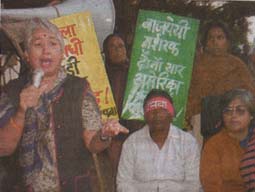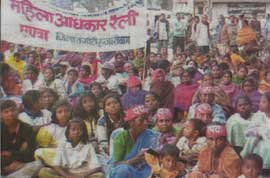 Jharkhand
AIPWA conference
Jharkhand
AIPWA conference
 Jharkhand
AIPWA conference
Jharkhand
AIPWA conference THE FIRST state conference of Jharkhand AIPWA was conducted in Ranchi, the capital of the newly formed Jharkhand state on 29-30 December 2001. The two-day conference was dedicated to the memory of heroic women leader and fighter Singi Dai, a tribal woman, who had led a huge contingent of women in men’s attire, and armed with traditional weapons, into battle against Moghul invaders after the men had fled the villages. The day of martyrdom of Singi Dai is observed as ‘women’s day’ in Jharkhand. Women dress in men’s attire and go out hunting, picking up fowl and goats owned by others, for a feast. It is a day of complete freedom for tribal women and no cases are registered against them for the ‘excesses’ committed.
A 1000-strong rally, with a contingent of tribal women from Hazaribagh donning shirts and trousers and armed with bows and arrows, spears, lathis and sickles marching at its head, started from the Ranchi Railway Station and covered almost 8 kms, raising slogans against the Babulal Marandi government as well as against Atal Bihari’s war jingoism. Colourful placards demanding 30% reservation for women for all posts in the forthcoming panchayat elections, an end to the practice of branding women witches and putting them to death, withdrawal of POTO and an end to police-raj in the state adorned the rally, and the rallyists wore red headbands with ‘AIPWA’ written in bright silver. It was a sight that Ranchi had rarely witnessed and passersby would watch the rally in awe as it passed through the Sainik Market and reached the square near Ranchi Townhall and converged into a mass meeting which continued with revolutionary songs and speeches by district leaders as well as by the state conveners of AIPWA Meena and Guni Oraon. Later in the evening the gathering was addressed by Comrades Srilata Swaminathan, Saroj Choubey and Kumudini Pati.
 In
the evening of 29th a seminar was organised on the topic “Reconstruction of
Jharkhand and the question of women’s assertion”. The seminar was conducted
by Meena and addressed by prominent intellectual Mr. B.P. Kesari, woman journalist
Basabi, as well as several activists of the organisation. Mr. B.P. Kesari emphasised
that historically women had enjoyed a privileged position in Jharkhandi society.
But this has been snatched away from them and they have been at the receiving
end of a lot of violence at the hands of the state as well as the mafia which
has come to acquire political power in Jharkhand. He stressed that it was only
through the political assertion women that they could provide strength to the
struggle for their liberation and he dismissed all talk of ‘women’s empowerment’
by the government as a farce. Ms. Basabi recounted in detail the struggles of
the Jharkhandi women and said that it was strange that the most hardworking
powerful force of Jharkhand, i.e. its women, was being subjected to the worst
kind of violence, suffering and denial of rights. She said the Jharkhandi people
had been taken for a ride and the natural resources of the state were being
looted by both the mafia and multinationals. She said the traditional rights
of the women on land, jungle and water were being taken away, reducing them
to contract labourers and resulting in large-scale migration. She mentioned
how the government had come down heavily on the people fighting the Koel Karo
project and how false cases had been registered against those supporting the
movement in any way. The seminar was concluded by Kumudini Pati, who urged the
participants to build the broadest possible unity of women with all progressive
and democratic forces in the state for the reconstruction of Jharkhand, defeating
the forces of right reaction at the helm of affairs. She called upon the Jharkhandi
people to oppose POTO tooth and nail while resisting police repression with
the might of women like Singi Dai.
In
the evening of 29th a seminar was organised on the topic “Reconstruction of
Jharkhand and the question of women’s assertion”. The seminar was conducted
by Meena and addressed by prominent intellectual Mr. B.P. Kesari, woman journalist
Basabi, as well as several activists of the organisation. Mr. B.P. Kesari emphasised
that historically women had enjoyed a privileged position in Jharkhandi society.
But this has been snatched away from them and they have been at the receiving
end of a lot of violence at the hands of the state as well as the mafia which
has come to acquire political power in Jharkhand. He stressed that it was only
through the political assertion women that they could provide strength to the
struggle for their liberation and he dismissed all talk of ‘women’s empowerment’
by the government as a farce. Ms. Basabi recounted in detail the struggles of
the Jharkhandi women and said that it was strange that the most hardworking
powerful force of Jharkhand, i.e. its women, was being subjected to the worst
kind of violence, suffering and denial of rights. She said the Jharkhandi people
had been taken for a ride and the natural resources of the state were being
looted by both the mafia and multinationals. She said the traditional rights
of the women on land, jungle and water were being taken away, reducing them
to contract labourers and resulting in large-scale migration. She mentioned
how the government had come down heavily on the people fighting the Koel Karo
project and how false cases had been registered against those supporting the
movement in any way. The seminar was concluded by Kumudini Pati, who urged the
participants to build the broadest possible unity of women with all progressive
and democratic forces in the state for the reconstruction of Jharkhand, defeating
the forces of right reaction at the helm of affairs. She called upon the Jharkhandi
people to oppose POTO tooth and nail while resisting police repression with
the might of women like Singi Dai.
The conference proper started late in the night with Comrade Srilata’s inaugural address. It was followed by Jharkhandi revolutionary songs rendered by the women’s cultural team Prerna led by Comrade Soni Tiriya. The draft organisational report was presented by Comrade Meena. It stressed that the fascist policies of the NDA government at the Centre were being pursued with full vigour by the Babulal Marandi government in Jharkhand. It said though the women of Jharkhand had long been cherishing the hope of getting a better deal after the formation of a separate state for which they had struggled with all their might, their aspirations have been thwarted by the power-hungry BJP. The Marandi government had only false promises, police repression, loot of development funds, caste and communal riots and greater violence on women to its credit. Neither had the government formed a state level women’s commission nor had it provided for reservation for women (including to the posts of pradhans and upapradhans) in panchayats. There was no social security for women migrating in large numbers in search of employment away from their villages. Economically marginalised, bereft of their traditional right to natural resources – land, water and forest produce, exploited as contract labourers and menial workers outside Jharkhand, brutalized at the hands of the police, the new state had little to offer to the womenfolk who constitute the major workforce of Jharkhand.
The 225 delegates to the conference unanimously affirmed the political thrust of the report that the women of Jharkhand would have to oust the present government in order to facilitate the struggle for their just rights. The report went on to say that the subjective strength organisation was not enough to meet the objective need of the hour. A state-level team of leaders with its centre in Ranchi was very much required, so that initiative could be taken on a host of issues. Although attempts had been made to organise working women in the coal sector, among household helps, unorganised labourers, the organisation had only been partially successful. Comrade Chinta Singh recounted the experience of organising women branded as witches in a separate organisation in Palamau and Comrade Guni Oraon mentioned how women had been organised into ‘jungle protection committees’ under the leadership of AIPWA to counter the government move of seizing forest land through its own agents. On the question of development schemes for women, several delegates mentioned that it was only through local struggles that the schemes could be implemented but majority of the funds were being appropriated by corrupt officials and politicians as well as a number of NGOs working under the pretext of guaranteeing the adivasis their rights.
Among the major demands raised at the conference were:
1) 33% reservation for women for all posts right from panchayat level up to parliament;
2) Registration and identity cards for women household helps;
3) A stop to migration of women workers through guaranteeing forest and agriculture based employment to women;
4) Severest punishment to perpetrators of rape and other kinds of sexual abuse of women;
5) Guarantee of equal wage for equal work for men and women;
6) A stop to dowry killings and murder of women branded as witches;
7) Free education for girl students up to graduation;
8) Withdrawal of POTO with immediate effect;
9) A stop to all kinds of repression on people’s movements including that on women’s struggles;
10) Constitution of women’s commission in Jharkhand;
11) A stop to privatization of industries and reopening of sick industries;
12) Enactment of state law against sexual harassment in the workplace; and
13) Remunerative prices for forest produce.
The conference resolved to oppose, at all costs, the war frenzy being whipped up by the NDA government. It resolved to launch an all-out offensive against the policy of no reservation for women for the posts of chiefs and deputies of panchayat institutions in the coming elections due in February. A 25-member state committee was elected with Comrade Guni Oraon as president and Comrade Meena as secretary.
– Kumudini Pati